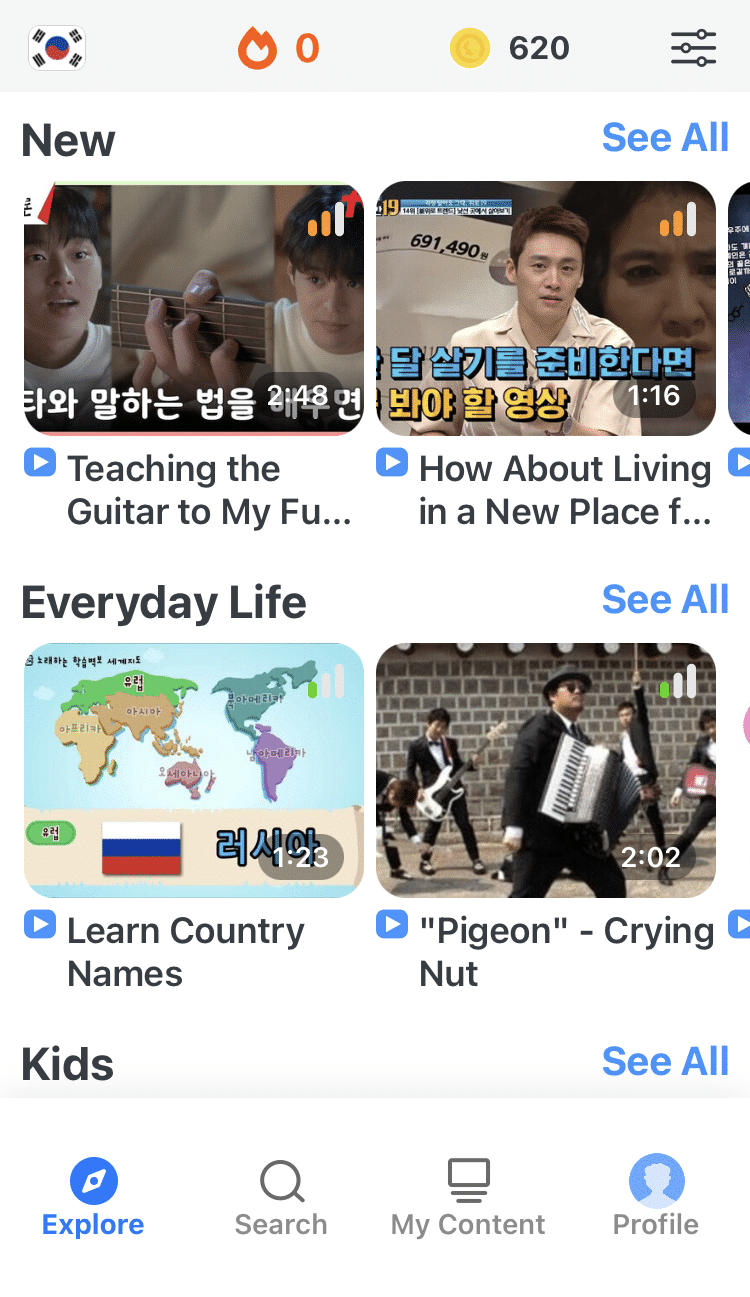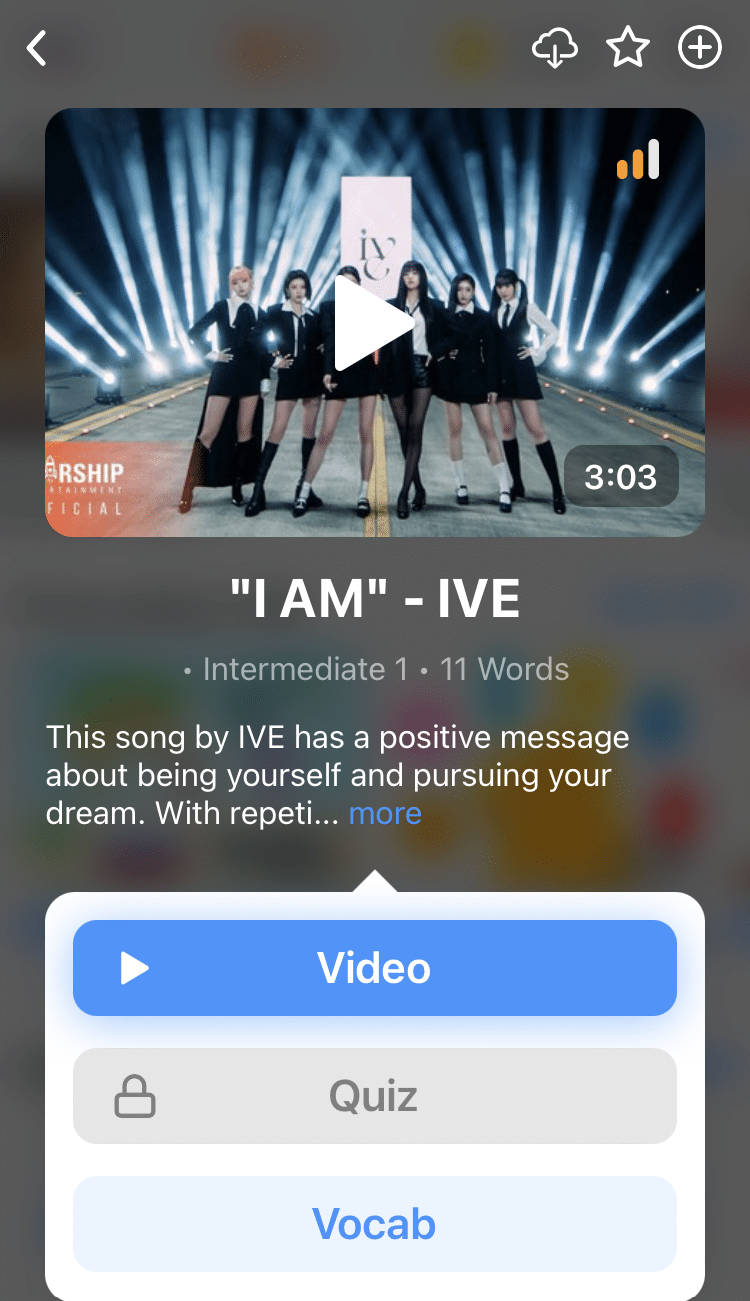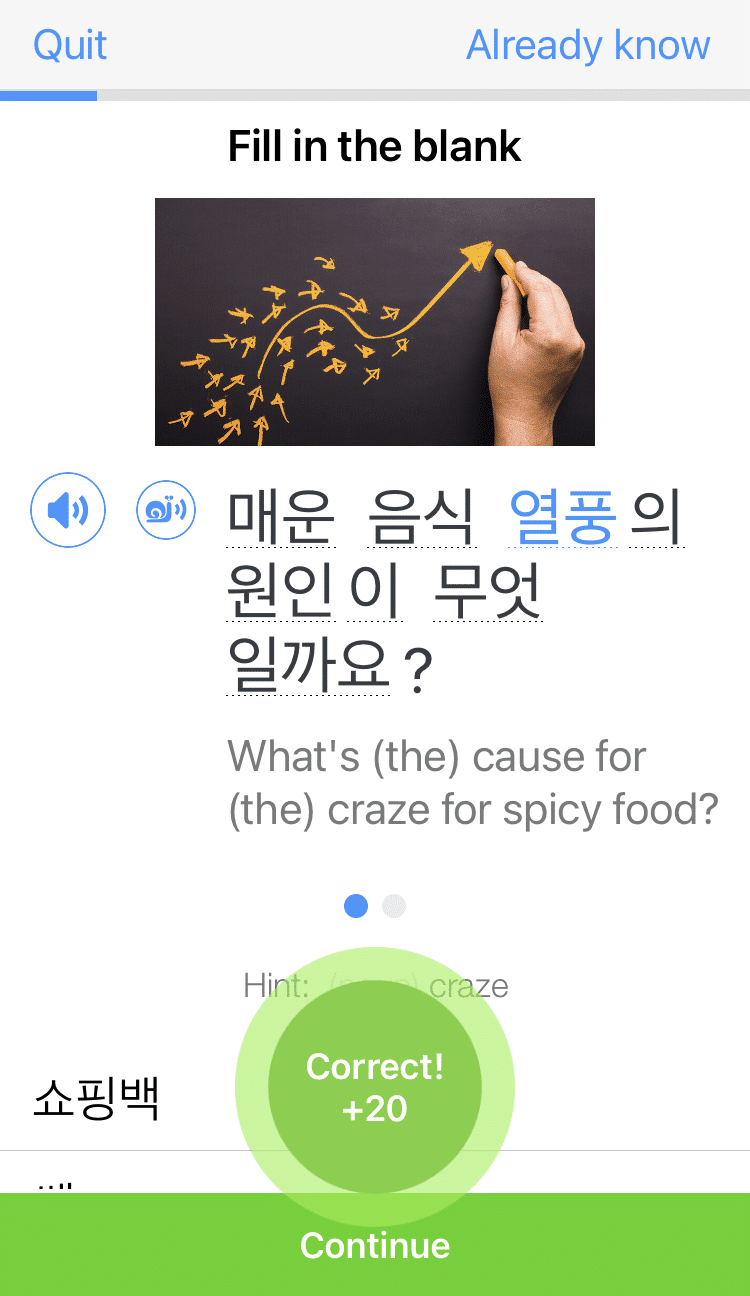
How to Learn Korean Fast [20 Tips]
Is it possible to hasten something as complex as learning Korean? The answer is, in theory, yes. It all comes down to how efficiently you study.
In this post, I’ll go over how you can learn Korean faster and smarter. I’ll touch on the key topics and tips that can help make you a more productive learner.
Contents
- 1. Learn Hangul
- 2. Learn the Korean Number Systems
- 3. Use Flashcards
- 4. Learn Common Vocabulary Using Frequency Lists
- 5. Don’t Worry About Formality Speech Levels Early On
- 6. Don’t Look for Exact Translations
- 7. Note and Fix Any Mistakes Immediately
- 8. Find a Korean Tutor
- 9. Do Language Exchanges With Native Korean Speakers
- 10. Find a Good Textbook for Grammar
- 11. Use Language Learning Apps
- 12. Read Children’s Books
- 13. Watch Korean Dramas/Variety Shows/Movies
- 14. Listen to K-pop
- 15. Set a Study Routine
- 16. Read Korean News
- 17. Follow Korean Accounts on Social Media
- 18. Join a Study Group
- 19. Follow Korean YouTube Channels Related to Your Interests
- 20. Practice Daily Immersion
- And One More Thing...
Download: This blog post is available as a convenient and portable PDF that you can take anywhere. Click here to get a copy. (Download)
1. Learn Hangul
First up: learn the Korean alphabet of Hangul (한글)!
Many learners love Hangul because of its simplicity and logic, so this step shouldn’t take you long! In fact, you may be able to learn all the characters of Hangul within a day or two.
Quick tips:
- To memorize them quickly, you should manually write out the characters on paper, as often as you can. Don’t just rely on visual memorization–as the saying goes, the shortest pencil is longer than the longest memory.
- Early on, practice writing consonant and vowel pairs to create two-character syllables. This will help you get used to written Korean and give you a good leg-up when you delve more into scribing out actual words.
Learn Hangul in 30 minutes with this video from Korean with Miss Vicky on YouTube:
2. Learn the Korean Number Systems
There are two main number systems in Korean: the Sino-Korean and the native Korean. You should learn both early on so you can engage in basic Korean dialogues that incorporate math.
Don’t worry, because the number systems are also not too difficult to learn. They follow logical patterns that make counting predictable.
Quick tips:
- Actively utilize Korean numbers instead of English numbers for your daily activities. For example, use Korean numbers when counting shopping items, telling the time, calculating prices, figuring out measurements for a recipe and so on.
- The native Korean number system only goes up to 99. It’s advised that you should (and would) spend more time studying Sino-Korean numbers.
3. Use Flashcards
Flashcards are a great tool for the speedy learner. They’re easy to make, highly customizable and very portable.
It’s critical that you make specified decks, not just a mountain of unorganized flashcards. Distinguish deck topics in whatever way makes obvious sense, whether by color, storage space, stickers, etc.
Quick tips:
- As soon as you start learning any vocabulary in Korean, you should be scribbling and stocking up flashcards. Don’t wait to make them–make decks at the same time you’re studying, not at some later designated time.
- Make flashcards simple and easy to read so they can be read almost instantly. Don’t clutter them with too much information.
- Rifle through flashcards whenever you have a few moments to spare. Whenever you have some empty time (such as when you’re commuting to work, waiting for a friend, standing in line), take out and peruse through flashcards.
4. Learn Common Vocabulary Using Frequency Lists
To be pragmatic, you should learn the most essential Korean vocabulary first. This is so that early on, you can familiarize yourself with the most frequently-used words and understand the bulk of very basic conversations. Plus, you can easily identify more challenging vocabulary that you can note and tackle later.
Fortunately, it’s very easy to find word frequency lists online. The most popular one for Korean consists of 6,000 words. Make it a priority to nail down these critical words before you jump headfirst into other vocabulary.
Quick tips:
- Make flashcards for high-frequency words ASAP.
- Try to learn the common vocabulary within sentences, not just in isolation. That way, you can learn how they’re typically used.
- Don’t just read them! Listen to native Korean speech to see how many of the common words are used.
Learn some of the most essential words and phrases with this video from the FluentU Korean YouTube channel:
5. Don’t Worry About Formality Speech Levels Early On
Formality speech levels are a common hang-up for Korean language learners. In total, there are about seven different levels in Korean.
While they’re reasonably important, speech levels shouldn’t be a topic you explore in depth at the beginning. They’re known to suck up a lot of unnecessary study time that could’ve been spent more productively.
Quick tips:
- For much of your initial Korean studies, just focus on the standard speech level (해요체). This will be the speech level you’ll encounter most often in educational and authentic korean resources, and even with just knowing this one speech level, you can understand most of everyday speech.
6. Don’t Look for Exact Translations
Scratching your head because you can’t find the perfect definition for a Korean word? Well, you should stop scraping up your scalp, because you probably won’t get an answer.
Searching for direct translations is a common time-waster for many language learners. In truth, there are so many words in Korean that you can’t find a 100% English equivalent for. There are many implicit cultural nuances that something like Google Translate can’t provide for you.
Quick tips:
- Learn Korean vocabulary based on readily available dictionary translations, while knowing that they likely don’t provide the full picture. You’ll get that full picture as you get more and more exposure to words in context.
- If noting down a translation for a certain word, include an example sentence so that its usage is clear.
7. Note and Fix Any Mistakes Immediately
Mistakes aren’t just good. They’re great!
Being scared of and dismissing mistakes boosts the chances of you messing up again in the exact same manner. So, if you want to improve swiftly, it’s time to fully embrace the errors.
Quick tips:
- Whether it’s pronouncing, reading or writing something in Korean, any time you don’t get something right, note it down immediately. Address the issue at once, see what went wrong, and also note the solution down. Don’t wait!
- Compile your mistakes into a document of some sort, and once in a while (weekly is a good default), scan through the list. You may pick up a pattern of your weak spots that can reveal what exactly you should lend more focus to.
8. Find a Korean Tutor
Having a tutor will greatly boost your learning consistency and readiness to memorize information.
As productive as self-study can be, a Korean tutor can be your direct language guide and practice partner. With his or her instruction, your skill acquisition will not only be much quicker, but also more accurate.
Quick tips:
- Before you decide on a tutor, make a list of what you know are your language priorities, strengths and weaknesses.
- Keep tutoring sessions consistent. If possible, schedule a number of them in advance.
- Instead of just one-and-done instruction, request plenty of speaking practice and assigned homework from your tutor.
9. Do Language Exchanges With Native Korean Speakers
Verbal and written Korean communication is absolutely vital in your language progress. It’s how you utilize all the Korean you know, at the same time. It’s also the quickest way to see your biggest problem spots.
Talking in Korean with native Korean speakers is an excellent way to hone your skills. They can teach you little tidbits of lingual or cultural knowledge that can further your understanding in ways that self-study can’t. You’ll get a lot of immediate exposure to authentic Korean during your chat, including everyday slang.
Quick tips:
- To challenge yourself, really commit to using only Korean during your conversations. Even when asking questions, try to use as much Korean as possible to test your comprehension. This way, native speakers may also more comfortably respond in a way that accommodates you, and your mistakes will be quickly caught and addressed.
- In terms of what to talk about, don’t just speak on education-related topics. Focus more on casual everyday dialogue, heavily utilizing the content you learn from word frequency lists.
10. Find a Good Textbook for Grammar
The sooner you get exposed to the basics of Korean grammar, the quicker you can jump into crafting Korean sentences of your own.
Early on in your learning journey, pick up a basic Korean grammar book that you can read, reread, and reread some more. The keyword here is basic. Don’t go for advanced or even intermediate-level grammar books just yet.
Make it a point to revisit this guidebook often so that the fundamentals are drilled into your head.
Quick tips:
- Whenever you read Korean text, see and note what rudimentary grammar concepts you can pick out.
- Write out full grammatical sentences so you can practice your writing skills at the same time.
- Consistently mark the critical objects within a sentence (subject, verb, object) and their placements.
- Look for grammatical consistency as you encounter more and more Korean sentences.
11. Use Language Learning Apps
Language learning apps are incredibly useful, not just for their convenience and easy accessibility, but also for their interactive nature. They can make studying both easy and fun, usually at little to no cost.
And you don’t just have to depend on the eponymous Duolingo. There are many Korean language learning apps out there. Experiment with a couple and stick with the ones that are most useful to you.
Go specifically for apps that include audio, visual and textual context.
Quick tips:
- Don’t just download a bunch of apps all at once! There is such a thing as too much, which can jumble up and slow down your studies. Focus on one or two first and work to complete them in their entirety.
- Get a Korean dictionary app ASAP.
12. Read Children’s Books
Don’t underestimate their educational power. They really aren’t just for kids!
Children’s books are short, focus on basic vocabulary, have helpful visuals and show the fundamentals of grammar. That’s what makes them such prime learning materials for Korean language learners.
Quick tips:
- Start with children’s books with a story already familiar to you (ex. classic fairy tales, Aesop’s fables, etc). That way, you can already come in with some idea of what you’re reading and interpreting.
- When reading, instead of just picking out isolated words you understand, look at a sentence in its entirety and break down how it’s structured. Use your grammar textbook as an aide.
13. Watch Korean Dramas/Variety Shows/Movies
They’re not just wildly entertaining. Korean shows and Korean films can be as educational as they are engaging.
Turning your watch time into study time is one of the best ways you can learn and have fun at the same time. You’ll get exposed to a lot of essential Korean speech used in an authentic manner, in a way that books simply can’t cover in depth.
Quick tips:
- Don’t use English subtitles as a crutch. When watching a Korean show or movie, challenge yourself by either turning off English subtitles or turning on Korean subtitles. The latter will help you practice your listening and or reading comprehension, both aided by visual context.
- Pause and or rewind as often as needed if you hear something spoken in Korean that you’d like to understand. Don’t just skip past it!
You can study using Korean media with a language learning platform like FluentU.
FluentU takes authentic videos—like music videos, movie trailers, news and inspiring talks—and turns them into personalized language learning lessons.
You can try FluentU for free for 2 weeks. Check out the website or download the iOS app or Android app.
P.S. Click here to take advantage of our current sale! (Expires at the end of this month.)
14. Listen to K-pop
Chances are, you’re already a big fan of K-pop. Your favorite bops can be amazing study resources, made especially helpful because of how catchy they are.
Although a lot of K-pop doesn’t consist of the slowest beats and often includes rap verses, that shouldn’t stop you from listening to them anyway. Even if you’re still a beginner, you can still gain plenty of listening and pronunciation practice by singing out loud and proud.
Quick tips:
- Have a transcript (in both English and Korean) of the lyrics. Follow along to the text as you listen and mark vocabulary that you know or are unfamiliar with.
Try studying with Jennie’s popular song ‘Solo’ with this video from the FluentU Korean YouTube channel:
15. Set a Study Routine
Figuring out in advance when and what you’ll work on in an upcoming Korean study session isn’t just a way to save time. Organization is paramount when it comes to efficient and consistent learning.
When you have direction in your study routine, you can more easily track your progress and set goals and expectations. Without order, your learning course can quickly become slow and meandering.
Quick tips:
- Set a study schedule for at least an entire week, not just one or two days, so you don’t have to waste time figuring out what to learn next.
- In your schedule, include specific resources or topics you’d like to cover at certain moments.
16. Read Korean News
If you want to swiftly boost your reading and vocabulary skills, Korean news articles can provide the intensive practice you need.
There are websites that provide beginner-level (for learners) Korean news transcripts, all for free. Try to read at least one article per day–focus first on topics most relevant or interesting to you, so that the vocabulary you encounter in the article is suitable to your learning needs.
Quick tips:
- As with children’s books, when reading a news article, don’t just “pluck out” individual words you know. Pay careful attention to the overall structure of sentences.
- Put a lot of focus on verb conjugations, as news articles will be full of them (particularly in the past tense).
17. Follow Korean Accounts on Social Media
Who said that social media is all brain-rot material?
If you follow Korean accounts on social media, your everyday browsing can provide many short opportunities to work on your Korean skills. It helps that most social media posts tend to be short and oftentimes include pictures. Plus, social media posts are a great way to learn slang and internet-speak.
To make things more interesting and relevant to you, follow Korean accounts that discuss topics you’re interested in, whether it’s music, art, sports, politics, etc.
Quick tips:
- Any time a new media post comes up, don’t just read it/scroll past it–interpret it to the best of your ability.
- Try not to use the offered, automatic aid of Google Translate.
- When you encounter a slang term, note it down and try to research its etymology.
18. Join a Study Group
Self-studying is great and can be very productive on its own, but if you want to really power-up your skills in a shorter amount of time, then you should study Korean with other learners (in-person or virtually).
A study group of like-minded peers will greatly boost your accountability, meaning that your motivation and discipline for Korean studies can be kept intact.
To make the best of a study group, set up consistent meetings with allotted time slots. If holding meetings virtually, figure out the easiest platform for all members to use.
Quick tips:
- Before any study group meeting, decide beforehand on a specific topic you’d all like to discuss.
- Prepare questions and explanations prior to the meeting, which can fill any “dead air” or moments of silence.
- Don’t be scared to turn on your microphone to talk with your groupmates–it can make communication, and speaking practice, much easier.
19. Follow Korean YouTube Channels Related to Your Interests
There are plenty of YouTube channels and videos that are expressly meant to teach learners Korean. You should certainly check them out, but don’t stop there.
Find some appealing YouTube channels (that aren’t necessarily educational in nature) run by Korean folks. Most importantly, as with the earlier tip regarding social media posts, make sure they discuss topics that are interesting to you, whether it’s sports, music, celebrities, nature, video games, etc etc.
By watching these videos, you’ll quickly learn a lot of Korean vocabulary in visual, audio and or textual context while being engaged with the material at the same time. This strategy is actually how many of my own Korean-learning friends jumped ahead in their conversational Korean skills.
Quick tips:
- Popular Korean channels may have English subtitles included in their videos. Try to watch without them first to see how much you understand, and then bring up subtitles if necessary. Also note that subtitles aren’t always accurate, so note any questionable translations/parts that you can study for yourself later.
- Feel free to check out (or join!) the comment discussion as well, so that you can practice your reading and writing skills.
20. Practice Daily Immersion
If you really want to make your Korean language skills rocket, then a little shift in mindset can make it so: instead of just making Korean studies its own separate event, why not make Korean language exposure an everyday matter that you don’t think twice about?
In other words, incorporate the Korean language into your daily activities, so that in essence you’re constantly practicing and learning.
It sounds like a dramatic change, but it really isn’t! This is a strategy known as language immersion, and it’s actually quite easy to do because there are so many ways to go about it. The main point is to find the “Korean counterpart” to things you normally perform in the English language, such as:
- Making Korean meals using Korean recipes
- Going to a Korean supermarket for your groceries
- Reading Korean comics
- Watching Korean-language films more often than English-language ones
The more you make the Korean language a daily matter, the more you’ll absorb it and the quicker you’ll learn. It won’t seem like a “foreign” language to you anymore, which is a huge step forward in your studies.
Quick tips:
- One of the most favored and instant immersive strategies (and one frequently encouraged within this guide) is to consume a lot of Korean media.
- Speak Korean aloud as often as possible. Verbal practice is incredibly important, but often overlooked, in language self-studies.
If you consistently follow the tips listed here, then your Korean language skills will improve by leaps and bounds in no time.
And remember, you won’t notice increased speed during the moment. It’s something you’ll become aware of and appreciate over time, as your enjoyment of and dedication to learning Korean grows.
And One More Thing...
If you enjoyed this post, you're already halfway to having the time of your life learning Korean with FluentU!
FluentU makes it possible to learn with K-pop videos, funny commercials, entertaining web series and more. Just a quick look will give you an idea of the variety of FluentU videos on offer:

FluentU really takes the grunt work out of learning languages, leaving you with nothing but engaging, effective and efficient learning. It's already hand-picked the best videos for you (which are organized by level and topic), so all you have to do is simply choose any video that strikes your fancy to get started.
Each word in the interactive captions comes with a definition, audio, image, example sentences and more.

Access a complete interactive transcript of every video under the Dialogue tab, and easily review words and phrases from the video under Vocab.

You can use FluentU’s unique Quiz Mode to learn the vocabulary and phrases from the video through fun questions.

FluentU keeps track of what you're learning, and tells you exactly when it's time for review, giving you a 100% personalized experience.
Review sessions use video context to help embed the words in your memory.
Start using the FluentU website on your computer or tablet or, better yet, download the FluentU app from the iTunes or Google Play store. Click here to take advantage of our current sale! (Expires at the end of this month.)



